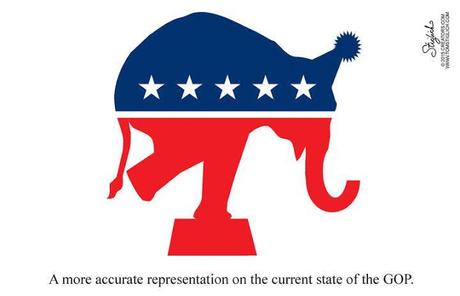 (The cartoon image of the GOP above is by Tom Stiglich at tomstiglich.com.)
(The cartoon image of the GOP above is by Tom Stiglich at tomstiglich.com.)What does the future hold for the Republican Party is a very good question. For a while now, they have been a party made up of opposing views, but past presidential candidates have generally been able to hold those different elements together. Their current candidate, Donald Trump, seems to care only about himself -- and makes no real effort to unify the party. This sets up a real battle for the soul of the party after the election.
Leigh Ann Caldwell and Benjy Sarlin have written an excellent article for NBC News on this subject. The article is lengthy, but well worth reading. Here is the opening segment:
When Donald Trump entered the presidential race in June 2015, the Republican Party was divided. By the time he accepted his nomination just over a year later, it had shattered into pieces. The GOP for years was a diverse but sturdy three-legged stool of security hawks, tax cutters and religious conservatives. Within that coalition, stakeholders might jostle for prominence but generally got along, united by the common goal of winning elections. Divisions within the party existed before Trump won the 2016 nomination, but were exacerbated in recent years as establishment Republicans battled with conservative populists over a variety of hot-button issues, including immigration. Tactical fights erupted over whether to threaten government shutdowns and how much to compromise with Democrats. Smaller factions within the party, like libertarians, battled to push their policies to the top of the agenda. Then came Trump. The real estate mogul’s ascent didn’t just catch Republicans by surprise, it went against everything many party stalwarts thought they knew about the GOP and its voters. Trump violated party orthodoxy on trade, entitlement reform, money in politics and national security. He exposed a huge portion of the Republican base that either disagreed with party leaders on key issues or didn’t care what they had to say. To some degree, the celebrity candidate challenged the idea that policy proposals even mattered: His own positions were far from consistent; he shifted regularly, even on signature issues; and he scoffed at the need for depth or nuance. The thrice-married candidate’s checkered personal history and crude rhetoric flew in the face of the party’s religious, conservative image. And his appeals to bigotry forced some Republicans to consider whether the left’s portrayal of the GOP as the party of white resentment was more accurate than they had once thought. “The party of Reagan was the party that had coalitions that worked seamlessly together,” GOP strategist John Feehery said. “What Donald Trump has identified is a party that is literally splitting apart between the donor class and the working class parts of the party.” Whether or not Trump prevails in November, the GOP is set for a rebuilding process like none in recent memory. If he wins, he’ll face a Congress whose leaders have largely distanced themselves from his brand and who oppose much of his agenda. If he loses, his one-of-a-kind candidacy offers each faction of the party a credible argument that its approach would have carried the election instead.

